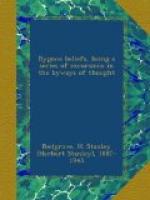XII
THE CAMBRIDGE PLATONISTS
THERE is an opinion, unfortunately very common, that religious mysticism is a product of the emotional temperament, and is diametrically opposed to the spirit of rationalism. No doubt this opinion is not without some element of justification, and one could quote the works of not a few religious mystics to the effect that self-surrender to God implies, not merely a giving up of will, but also of reason. But that this teaching is not an essential element in mysticism, that it is, indeed, rather its perversion, there is adequate evidence to demonstrate. SWEDENBORG is, I suppose, the outstanding instance of an intellectual mystic; but the essential unity of mysticism and rationalism is almost as forcibly made evident in the case of the Cambridge Platonists. That little band of “Latitude men,” as their contemporaries called them, constitutes one of the finest schools of philosophy that England has produced; yet their works are rarely read, I am afraid, save by specialists. Possibly, however, if it were more commonly known what a wealth of sound philosophy and true spiritual teaching they contain, the case would be otherwise.
The Cambridge Platonists—BENJAMIN WHICHCOTE, JOHN SMITH, NATHANAEL CULVERWEL, RALPH CUDWORTH, and HENRY MORE are the more outstanding names—were educated as Puritans; but they clearly realised the fundamental error of Puritanism, which tended to make a man’s eternal salvation depend upon the accuracy and extent of his beliefs; nor could they approve of the exaggerated import given by the High Church party to matters of Church polity. The term “Cambridge Platonists” is, perhaps, less appropriate than that of “Latitudinarians,” which latter name emphasises their broad-mindedness (even if it carries with it something of disapproval). For although they owed much to PTATO, and, perhaps, more to PLOTINUS (c. A.D. 203-262), they were Christians first and Platonists afterwards, and, with the exception, perhaps, of MORE, they took nothing from these philosophers which was not conformable to the Scriptures.
BENJAMIN WHICHCOTE was born in 1609, at Whichcote Hall, in the parish of Stoke, Shropshire. In 1626 he entered Emmanuel College, Cambridge, then regarded as the chief Puritan college of the University. Here his college tutor was ANTHONY TUCKNEY (1599-1670), a man of rare character, combining learning, wit, and piety. Between WHICHCOTE and TUCKNEY there grew up a firm friendship, founded on mutual affection and esteem. But TUCKNEY was unable to agree with all WHICHCOTE’S broad-minded views concerning reason and authority; and in later years this gave rise to a controversy between them, in which TUCKNEY sought to controvert WHICHCOTE’S opinions: it was, however, carried on without acrimony, and did not destroy their friendship.




